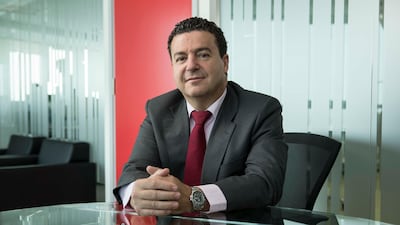Population growth rather than low oil prices is fueling the GCC construction sector, according to Spanish construction firm, Acciona.
A three-year lull in oil prices has forced GCC governments to cut spending, put a hold on some projects and slash jobs. Contracts in Saudi Arabia, the region's largest market, dropped by 51 per cent in the first quarter of last year compared to 2015, indicating a slowdown in the region's construction sector, according to an E&Y report.
____________________________________________
Read more:
Saudi Arabia makes another move toward privatisation
____________________________________________
Al Khodari, a contractor in the kingdom slashed more than 8,000 jobs in 2015 while the Binladin Group released up to 60,000 labourers out of 200,000 workforce last year, according to the consultancy's report. Several media outlets in Saudi Arbia reported this week that Saudi Oger, owned by the family of former Lebanese prime minister Rafik Hariri has closed up shop.
"We know that the market has recently contracted for infrastructure, but it's just an impasse," said Jesus Sancho, the Middle East director of Acciona. Infrastructure projects need to be developed for healthcare, housing, commercial needs and transportation as the population throughout the region continues to rise and put a strain on existing frameworks.
____________________________________________
Read more:
Second quarter blues for the UAE, Saudi construction sector, report says
____________________________________________
The population of the GCC rose by almost 20 per cent – more than six times the rate of growth in the United Kingdom or United States (2.9 per cent and 2.7 per cent respectively), according to the Centre for Economic and Business Research and ICAEW. In the UAE a child is born every three minutes with nearly 160,000 births to citizens and non-citizens in 2015, according to the latest figures from the Federal Competitiveness and Statistics Authority.
"Anything that's intimately related to the growth of populations are the first priorities that clients are tending to," he said.
The rapid pace of growth trickles into the utilities sector, impacting power and water projects in the pipeline across the GCC. That has led to a 10 per cent year-on-year growth for Acciona's Middle East division with a turnover of more than US$1.3 billion last year, of which the UAE accounts for about 70 per cent.
"At the moment the frontline is the UAE, the country hasn't stopped issuing tenders and contracts – it's quite active," said Mr Sancho.
The company's membership of the consortium that won the Dubai Metro expansion by the Road and Transport Authority (RTA) worth $2.5bn as well as the $800 million engineering, procurement and construction project of the 800 megawatt solar plant by the Dubai Electricity and Water Authority has fuelled Acciona's revenue.
Beyond the UAE, Saudi Arabia is on the firm's radar given the direction set out by the National Transformation Plan and economic development agenda under Vision 2030 which aim to open the country to private investment. The kingdom is preparing tenders for public-private partnerships in various sectors including power and construction.
These projects "will be massive" and Acciona is looking to gain a piece of the pie, said Mr Sancho.
Across the oil-reliant GCC, measures are being implemented to have companies carry more of the financial burden for projects to help ease the pressure on government coffers.
The size of projects that are coming up in Saudi Arabia will run into the tens of billions of dollars, including replicating the Riyadh metro line across other large cities such as Jeddah and Dammam.
Gulf countries are also ramping up efforts into renewable energy to help offset demand for oil and gas as the main feedstock for electricity. Mr Sancho added: "We are aiming to continue growing. If say there are four to five mega projects a year in the GCC, we expect to get at least one."

